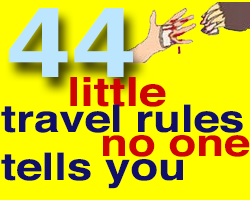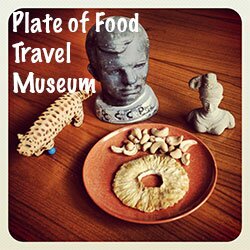If travel’s supposed to be about self-discovery, should professional travelers and writers dictate how everyone needs to do it? As if there’s a pressing need for the travel movement, and only one way to get there.
Recently in the New York Times, Ilan Stevens and Joshua Ellison — a lit professor and editor — gauged the differences between “meaningful, fruitful travel” and “mere tourism.” They called the piece “Reclaiming Travel,” harkening back to pre-modern pilgrimages, and wrote “we must bring back the idea of travel as a search.” Similarly, as nice as Pico Iyer’s 2009 World Hum essay on “Why We Travel” is — and I love how he dispels the traveler/tourism debate — he writes we travel to first lose ourselves, then find ourselves.
Really?
I didn’t set out to travel for any lofty reasons at all. I just looked for the best time to travel as I wanted to see stuff. And I had a bug that another Oklahoma summer couldn’t satisfy. So instead of saving for a nice car, I bought a Eurail pass. This might be similar to how passionate wanderlusts have the approach to traveling. Rather than spending money on materialistic items, they spend it to achieve their traveling goals. Some even have their own RVs that might enable them to travel across the country without worrying about coming home as the vehicle itself is the home. If need be, they can rent a self-storage unit at Storage Post (or the ones like them offering storage solutions) that can help them store their belongings that they may not be able to travel with. That said, I think everyone should do the same. But after living abroad, and five years of updating Lonely Planet guidebooks, I eventually gave up trying to make everyone back home see “travel” the same way I did. I saw travel as a life quest. But for some, it’s just partying with Jeff at the lake.
And, I finally learned, that’s perfectly fine. (As long as no one was hurt by it.)
Travel is not a science. It’s not a course or competition. It’s supposed to be fun, above all. Otherwise, we wouldn’t do it. However, for some people, the journey to the destination becomes boring. They may enjoy their destination, but lack the knowledge to make the journey equally enjoyable. Perhaps, a flight for 12 hours or a bus ride for 8 hours at night may seem monotonous, so they may want to invest their time in listening to songs or playing blackout bingo (those wondering, “is blackout bingo legit?” can read through resourceful blog posts to learn about it) on the Internet. While travelling, they can maintain their excitement by doing this. At least, that is what I do most of the time. And honestly, it does help me from getting bored. Truth be told, I love all aspects of travelling. And all the philosophical justifications– that it broadens the mind, lets you find yourself and see your home etc — certainly ring true to me. But only retrospectively. When I started I just had the urge. And I’m glad I wasn’t judged as mistakes and revelations came along the way.
Don’t forget professional travelers are paid money to think and write about travel, offering both time and cause for exploration than any two-weeks-vacation-a-year traveler can afford. The best we travel writes can do is offer stepping stones. Show how much IS possible in travel, not by somber testaments but by example. That’s tips gleaned from our own mistakes (here’s my 44), glowing descriptions of places, even bus schedule times (I can’t tell you how inspired I was early on, plotting out imaginary trips simply using Lonely Planet’s bus schedule info.)
Offer some stepping stones travelers can choose to use, then get out of their way and let them plot their own paths.









